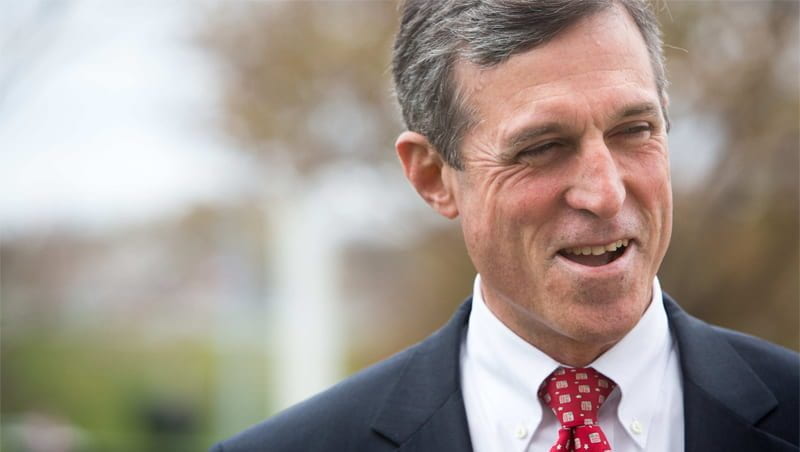HISTORIC DEPARTMENT, CUTTING-EDGE RESEARCH
Photo by Kathy F. Atkinson and Erica K. Brockmeier
November 07, 2022
UD’s Department of Chemical and Biomolecular Engineering hosted Gov. Carney to celebrate No. 2 ranking
The University of Delaware’s Department of Chemical & Biomolecular Engineering hosted Governor John Carney on a visit to the UD campus on Monday, Oct. 31, to celebrate the recent U.S. News & World Report’s No. 2 ranking of its undergraduate chemical engineering program.
During a presentation and tours of facilities in Colburn Lab and Harker Interdisciplinary Science and Engineering (ISE) Laboratory, faculty and students from UD’s College of Engineering (COE) were able to showcase the local, state, and global impacts of their research, educational and entrepreneurial activities.
“Chemistry has long been part of Delaware’s history, and with programs like the University of Delaware’s chemical engineering program, it will be part of our future,” said Gov. Carney. “We’re working to build on our science-based economy here in Delaware. Higher education continues to be an important partner in our efforts to both develop workforce talent and business ideas.”
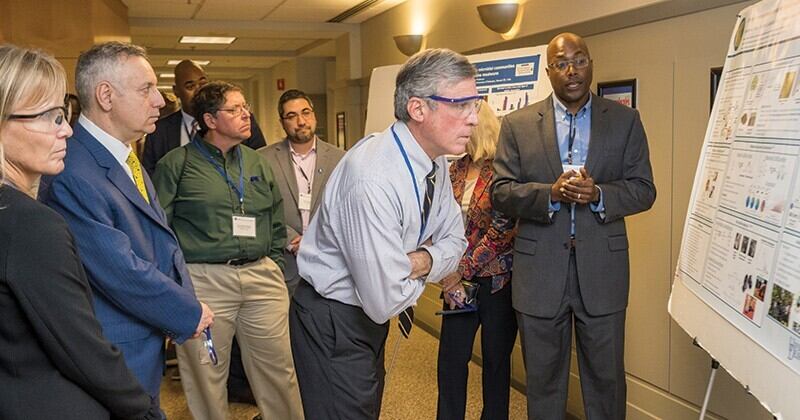
Thomas Epps, III (right), the Allan and Myra Ferguson Distinguished Professor, shared his group’s research on converting biomass into usable products, such as polymers that can be used in 3D printing, with Gov. John Carney (center).
UD President Dennis Assanis delivered opening remarks at the event.
“Here at UD, we’re proud of many things, and one asset that we’re very proud of is our chemical and biomolecular engineering department,” Assanis said. “This excellence is thanks to our dedicated faculty and staff, who do amazing research and are also amazing inside the classroom. We’re excited to show you what we’re doing here and how we’re driving engineering to the future.”
Dean Levi Thompson shared highlights and statistics of the College and how COE’s programs, including chemical engineering, help attract and train diverse talent that forms a hub of innovation, research and entrepreneurship for the state. Thompson also highlighted COE’s ongoing impact on the local economy, including dual degree programs, biomanufacturing facilities and infrastructure, and new and ongoing industry partnerships. This includes the partnership with Chemours and work being done at their Research Hub at the Science, Technology and Advanced Research (STAR) campus.
“Our goal is to have great impact locally but also be relevant to global and national issues,” said Thompson, referring to COE’s strategic vision while highlighting several of UD’s Centers of Excellence with an Engineering connection such as the Delaware Center for Musculoskeletal Research (DCMR), the Center for Hybrid, Active, and Responsive Materials (CHARM), the Center for Plastics Innovation (CPI), the National Institute for Innovation in Manufacturing Biopharmaceuticals (NIIMBL), and the Catalysis Center for Energy Innovation (CCEI).
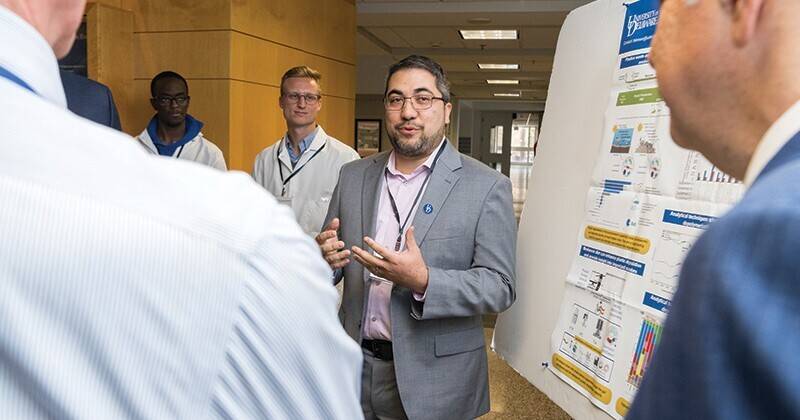
Department Chair Millicent Sullivan then shared statistics about the chemical engineering department, which is home to 353 undergraduate students, 198 graduate students and 31 faculty members. Along with its highly-ranked undergraduate program, the department also has a top 10 graduate program.
Sullivan described her department as both a historic 100 year-old program with strong industrial roots and cutting-edge, thanks to the creativity of UD researchers who tap into a “wide range of molecular building blocks” beyond what is typical for the field. “By using a diverse range of engineering tools to analyze and understand what happens at a molecular level, the work of our faculty and students is impacting a wide range of application areas, from clean energy and sustainable materials to biomanufacturing and engineered medicines,” she said.
Sullivan, who is also the Alvin B. and Julie O. Stiles Professor of Chemical and Biomolecular Engineering, then led Carney and guests on a tour of facilities in Colburn and ISE to meet faculty and students. The tour highlighted the department’s emphasis on collaborative projects and how faculty and student researchers are building upon the department’s industry-driven origins to make UD a driver of tech transfer, innovation and job creation for the region.
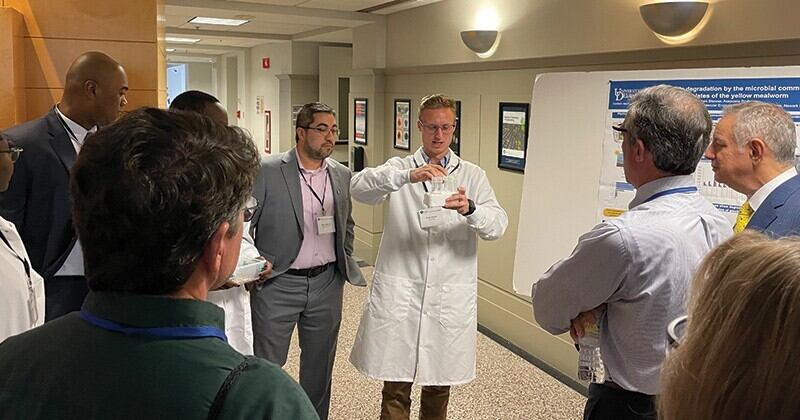
Marianthi Ierapetritou, Bob and Jane Gore Centennial Professor, Eleftherios Papoutsakis, Unidel Eugene du Pont Chair, and doctoral students Katie Raudenbush and Nikola Malinov discussed their monoclonal antibody manufacturing research with Carney, who then visited the lab of Abraham Lenhoff, Allan P. Colburn Professor, whose group helps process and purify the antibodies made by the labs of Ierapetritou and Papoutsakis.
Next, Thomas Epps, III, the Allan and Myra Ferguson Distinguished Professor and the Director of the Center for Research in Soft Matter and Polymers (CRiSP) and the Center for Hybrid, Active, and Responsive Materials (CHARM), discussed his group’s research on converting biomass into usable products, work that has led to the creation of a Delaware-based start-up called Lignolix.
Assistant Professor Kevin Solomon and Associate Professor Mark Blenner then discussed their collaborative research on plastic biotransformation and how the department’s strong culture of collaboration attracted them both to UD in 2020. Sophomore Mekhi Williams, senior Toni Akin-Adenekan and doctoral students Ross Klauer brought along some of the mealworms that the team is studying due to the plastic degradation capabilities of microbial cells found in the mealworm gut.
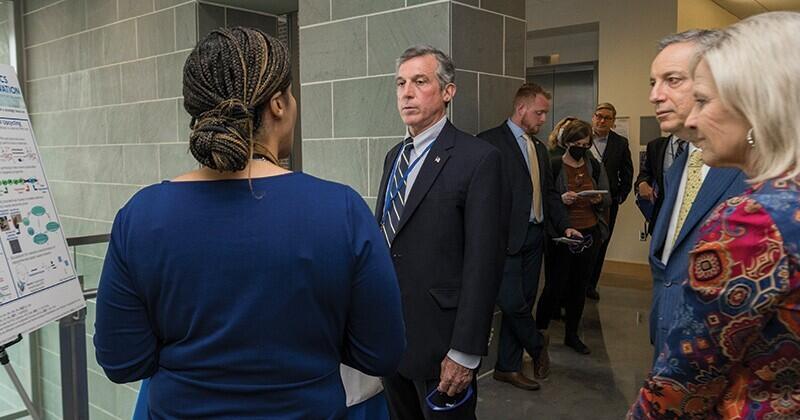
At the ISE lab, Distinguished Professor LaShanda Korley highlighted projects happening in the CPI, which she described as UD’s “sustainability hub” for research on topics such as upcycling, degrading plastic waste and value-added chemistries.
Finishing the tour was Yushan Yan, the Henry Belin Du Pont Chair and Director of the new Center for Clean Hydrogen, who promoted UD’s expertise in hydrogen and clean energy research. Yan said that UD is the “undisputed champion” of technologies such as ion exchange polymers, platforms that are crucial for green hydrogen generation which will lead to more jobs and more students in the future.
During the visit, besides Assanis, Thompson and Sullivan, UD was represented by Provost Laura Carlson and Albert Shields from UD Government Relations. Industry partners at the visit included Brian Coll, the site manager of the Chemours Research Hub, and Kurt Foreman, president and CEO of the Delaware Prosperity Partnership. Additional state government representatives included Lt. Gov. Bethany Hall-Long, Rep. Paul Baumbach and a representative from the office of Sen. David Sokola Valerie McCartan.

